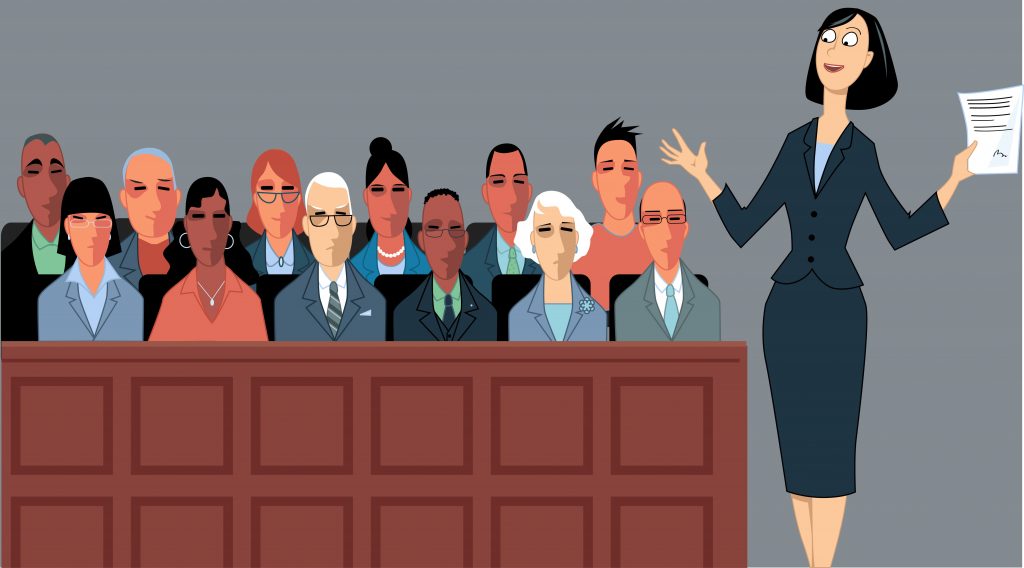Dealing With Rogue and Stealth Jurors
Juror misconduct can cause the innocent to be convicted, the guilty to go free, and taxpayers to pay for easily preventable retrials.
January 31, 2020 at 02:27 PM
4 minute read

Every lawyer and judge worries about the pernicious effect of rogue and stealth jurors, those who ignore the admonitions of the court to keep an open mind or lie through their teeth to get on a jury. Such jurors are truly a menace to the integrity of the criminal and civil justice systems, and such misconduct must be discouraged in the strongest possible way.
We are seeing far too many cases where jurors—despite very clear instructions from the judge and regardless of the solemn oath they took—are recklessly undermining the very bedrock of our system of justice. Two recent cases illustrate the point.
In New York, a murder conviction was overturned because of a juror who spent the trial sending and receiving texts about the case. In Massachusetts, the conviction of the Boston Marathon bomber is under challenge partially because two jurors concealed their social media posts about the case. The implications are obvious: Juror misconduct could cause the innocent to be convicted, the guilty to go free, and taxpayers to pay for easily preventable retrials.
 Gail Prudenti
Gail PrudentiLet's first look at United States v. Tsarnaev.
Dzhokhar Tsarnaev was found guilty of all 30 charges lodged against him in connection with the April 15, 2013 terrorist bombing and sentenced to death. Just a few weeks ago, a federal appellate court heard Tsarnaev's appeal, based partially on the allegation that two jurors made false claims about their pre-trial communication about the incident.
Both jurors insisted they had not commented on the case online prior to the trial. According to court records, both lied. The jury foreperson allegedly hid 22 Twitter posts mourning the victims, praising the police officers who would testify, and describing the innocent-until-proven defendant as a "piece of garbage." Another juror purportedly started a Facebook discussion about the jury selection process, prompting a friend to urge him to "play the part," "get on the jury" and send Tsarnaev "to jail where he will be taken care of." The U.S. Court of Appeals for the First Circuit will decide in the coming months whether the jurors' misconduct deprived Tsarnaev of his constitutional right to a trial before an unbiased jury.
In the New York case, the juror's misconduct was so over the top that the state's highest court had no choice but to throw out the conviction.
People v. M. Robert Neulander involved a doctor in Syracuse convicted of murdering his wife. Although the judge repeatedly told jurors they must not discuss the case with anyone and to report any person who tries to communicate with them about the case, Juror #12 sent and received more than 7,000 texts during the trial, including one from her father urging her to "make sure he's guilty." When another jury reported her misconduct and she was confronted by the court, Juror #12 lied under oath and deleted her web browsing history when she was directed to surrender her phone for forensic examination.
Although the prosecution argued that the proof against Dr. Neulander was so overwhelming that the juror's misconduct was insignificant, the state's highest court unanimously held that her "blatant disregard for the court's instructions coupled with her purposeful dishonesty and deception" was so egregious that the conviction cannot stand. The case, that began with a death in 2012, is back at the starting line.
Unfortunately, the Tsarnaev and Neulander cases are not isolated incidents of juror misconduct.
Last February, Acting Supreme Court Justice Wayne Ozzi in Richmond County had to dismiss an entire panel of prospective jurors because one of them did an internet search on the defendant's criminal history, and shared his findings with the group. A few months earlier, a potential juror in a Texas child molestation case researched the defendant and discussed his revelations within earshot of a juror. The judge declared a mistrial.
Juror misconduct is a serious issue with serious consequences for the justice system, as well as the offending juror. In rare instances, jurors have been held in contempt, fined and even criminally prosecuted for violating the court's instructions. Those are extreme measures, and no judge wants to punish a juror unless it is absolutely necessary. But that may be what it takes to send a message that our justice system cannot and will not tolerate rogue and stealth jurors.
Gail Prudenti is Dean of the Maurice A. Deane School of Law at Hofstra University. She formerly served as Chief Administrative Judge of the Courts of New York State, and Presiding Justice of the Appellate Division, Second Department.
This content has been archived. It is available through our partners, LexisNexis® and Bloomberg Law.
To view this content, please continue to their sites.
Not a Lexis Subscriber?
Subscribe Now
Not a Bloomberg Law Subscriber?
Subscribe Now
NOT FOR REPRINT
© 2025 ALM Global, LLC, All Rights Reserved. Request academic re-use from www.copyright.com. All other uses, submit a request to [email protected]. For more information visit Asset & Logo Licensing.
You Might Like
View All
Neighboring States Have Either Passed or Proposed Climate Superfund Laws—Is Pennsylvania Next?
7 minute read
Relaxing Penalties on Discovery Noncompliance Allows Criminal Cases to Get Decided on Merit
5 minute read

Trending Stories
- 1Avantia Publicly Announces Agentic AI Platform Ava
- 2Shifting Sands: May a Court Properly Order the Sale of the Marital Residence During a Divorce’s Pendency?
- 3Joint Custody Awards in New York – The Current Rule
- 4Paul Hastings, Recruiting From Davis Polk, Adds Capital Markets Attorney
- 5Chancery: Common Stock Worthless in 'Jacobson v. Akademos' and Transaction Was Entirely Fair
Who Got The Work
J. Brugh Lower of Gibbons has entered an appearance for industrial equipment supplier Devco Corporation in a pending trademark infringement lawsuit. The suit, accusing the defendant of selling knock-off Graco products, was filed Dec. 18 in New Jersey District Court by Rivkin Radler on behalf of Graco Inc. and Graco Minnesota. The case, assigned to U.S. District Judge Zahid N. Quraishi, is 3:24-cv-11294, Graco Inc. et al v. Devco Corporation.
Who Got The Work
Rebecca Maller-Stein and Kent A. Yalowitz of Arnold & Porter Kaye Scholer have entered their appearances for Hanaco Venture Capital and its executives, Lior Prosor and David Frankel, in a pending securities lawsuit. The action, filed on Dec. 24 in New York Southern District Court by Zell, Aron & Co. on behalf of Goldeneye Advisors, accuses the defendants of negligently and fraudulently managing the plaintiff's $1 million investment. The case, assigned to U.S. District Judge Vernon S. Broderick, is 1:24-cv-09918, Goldeneye Advisors, LLC v. Hanaco Venture Capital, Ltd. et al.
Who Got The Work
Attorneys from A&O Shearman has stepped in as defense counsel for Toronto-Dominion Bank and other defendants in a pending securities class action. The suit, filed Dec. 11 in New York Southern District Court by Bleichmar Fonti & Auld, accuses the defendants of concealing the bank's 'pervasive' deficiencies in regards to its compliance with the Bank Secrecy Act and the quality of its anti-money laundering controls. The case, assigned to U.S. District Judge Arun Subramanian, is 1:24-cv-09445, Gonzalez v. The Toronto-Dominion Bank et al.
Who Got The Work
Crown Castle International, a Pennsylvania company providing shared communications infrastructure, has turned to Luke D. Wolf of Gordon Rees Scully Mansukhani to fend off a pending breach-of-contract lawsuit. The court action, filed Nov. 25 in Michigan Eastern District Court by Hooper Hathaway PC on behalf of The Town Residences LLC, accuses Crown Castle of failing to transfer approximately $30,000 in utility payments from T-Mobile in breach of a roof-top lease and assignment agreement. The case, assigned to U.S. District Judge Susan K. Declercq, is 2:24-cv-13131, The Town Residences LLC v. T-Mobile US, Inc. et al.
Who Got The Work
Wilfred P. Coronato and Daniel M. Schwartz of McCarter & English have stepped in as defense counsel to Electrolux Home Products Inc. in a pending product liability lawsuit. The court action, filed Nov. 26 in New York Eastern District Court by Poulos Lopiccolo PC and Nagel Rice LLP on behalf of David Stern, alleges that the defendant's refrigerators’ drawers and shelving repeatedly break and fall apart within months after purchase. The case, assigned to U.S. District Judge Joan M. Azrack, is 2:24-cv-08204, Stern v. Electrolux Home Products, Inc.
Featured Firms
Law Offices of Gary Martin Hays & Associates, P.C.
(470) 294-1674
Law Offices of Mark E. Salomone
(857) 444-6468
Smith & Hassler
(713) 739-1250






